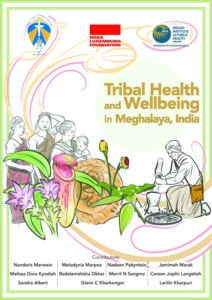Book review by
Dr. Riviarynthia Kharkongor, Dr. Benedicta Sthuti Kumar

Tribal Health and Wellbeing in Meghalaya, India
Martin Luther Christian University, Indian Institute of Public Health-Shillong
Sponsored by the Rosa Luxemburg Foundation, Germany
MLCU Press
415 pp
Rs 1099
The book Tribal Health and Wellbeing in Meghalaya, India-is a timely and deeply resonant contribution to the fields of public health, indigenous studies, and policy analysis. At a time when global health conversation increasingly emphasises equity, cultural sensitivity, and the need to decolonise health systems, this book offers a much-needed, grounded perspective rooted in the everyday realities of Meghalaya’s tribal communities. Drawing on ethnographic insights, empirical research, critical policy analysis, and the voices of the communities themselves, the book presents a holistic understanding of health, one that extends beyond disease and treatment. It explores how wellbeing is deeply connected to land, language, identity, autonomy, and social justice. Ultimately, it reminds us that health must be seen not just in medical terms, but also through cultural, ecological, political, and social lenses.
The book has two main sections. Section A has 15 chapters on various topics written by ten faculty members from the departments of social work, psychology and wellbeing, nutrition and environment and traditional ecosystems of Martin Luther Christian University. Section C has 11 research articles written by faculty of the Indian Institute of Public Health, Shillong. Interspersed between these two sections are the health policies of the state government. All chapters contain activities and exercises, enabling the book to be used as a textbook for training health workers or university students.
The structure of the book reflects its interdisciplinary strength-relevant in the context of Meghalaya. Organised into multiple sections, it begins with foundational theory and community perspectives, through analyses of health systems, traditional practices, and discussions of state policy and research ethics. This progression allows readers to engage with tribal health as both a lived experience and a policy challenge. The opening chapters set the tone by reframing health from an “indigenous worldview”, where wellness includes relationships with land, heritage, and community. This perspective challenges dominant biomedical paradigms and urges public health practitioners to recognise cultural specificity as essential not peripheral to effective healthcare.
Chapters exploring health-seeking behaviour, disease burden, and socio-cultural influences offer invaluable insights into how structural factors such as poverty, geography, and gender dynamics shape access to care. The book’s discussions of diseases and health are well-contextualised, illustrating the interplay between systemic healthcare gaps and local vulnerabilities. Particularly compelling is the work on cultural syndromes and traditional healing, which highlights the continued vitality and relevance of Indigenous health knowledge. Gender is addressed with sensitivity and depth, especially in discussions around maternal and child health, and in analyses of the systemic barriers that limit indigenous women’s participation in health governance. Additionally, the chapter on food and nutrition offers a powerful integration of agricultural practices, ecological knowledge, and health outcomes, making a strong case for nutrition-sensitive and culturally grounded health programming.
One of the book’s major strengths lies in its inclusion of the state’s health policies. The two policies-MOTHER Policy and the Mental Health and Social Care Policy, which are not only rigorous and evidence-based but also attentive to on-the-ground realities. Rather than offering distant critique, the book thoughtfully explores how these policies can be more closely aligned with tribal values, needs, and community strengths. By doing so, it not only deepens the reader’s understanding of Meghalaya’s evolving healthcare landscape but also highlights the state’s commitment to advancing health delivery.
The analysis of medical pluralism, AYUSH policy, and vaccine hesitancy thoughtfully critiques how state interventions often overlook or misinterpret indigenous ways of knowing. Crucially, tribal communities are not depicted as passive recipients of aid, but as active agents who navigate, adapt to, and negotiate within complex healthcare and policy systems. The final chapters focus on research ethics, intellectual property, and pedagogy areas, which are often neglected in public health texts. The call for ethical, community-led research practices and the advocacy for indigenous knowledge ownership are particularly timely. The book also provides concrete guidance for educators on how to teach tribal health with integrity, respect, and reflexivity.
For public health professionals, researchers, educators, and policymakers, the book “Tribal Health and Wellbeing in Meghalaya, India” is more than a resource- it is a guide to follow. It offers theoretical insight, practical tools, and, above all, a model for how to centre indigenous voices in the design and delivery of health interventions. It challenges us to rethink, reframe, and reorient our work through the lens of justice, dignity, and cultural respect. In a world where health systems often fail to engage meaningfully with cultural diversity, this book offers a compelling example of what grounded, interdisciplinary, and community-led collaboration can look like. It is an essential read for anyone committed to health equity, indigenous rights, and transformative public health practice.



